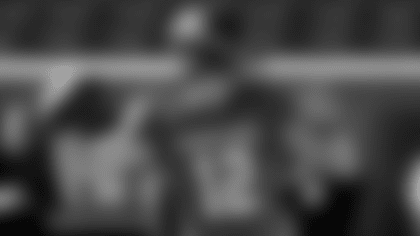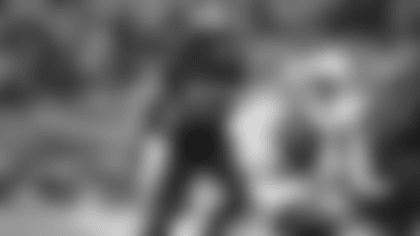The Redskins kept Jacquez Green from extending his streak of games with at least one 30-yard catch to five
Why did Tampa Bay come up just short on Sunday? The Redskins got the ball downfield and the Bucs did not
During the first four weeks of the 2000 season, the Tampa Bay Buccaneers' offense was intriguing. It wasn't uniformly excellent, but it did rack up the fifth-most points in the league and it did, more often than not, succeed with the run first, play-action pass second formula of Head Coach Tony Dungy.
The Bucs got off to a 3-1 start, losing only to the New York Jets thanks to an extremely uncharacteristic collapse in the final two minutes. Each of those first four games had something in common: Tampa Bay's offense produced more 'big plays' than it's opponents did.
For these purposes, a 'big play' is defined as a pass of over 20 yards or a run of over 10 yards. Through the first four games, the Buccaneers' offense had posted 22 big plays while the their defense had allowed only 11. Against New England, in a 21-16 opening-day victory, the Bucs had seven big plays to the Patriots' four. They posted six big plays against Chicago and allowed just three, then outdid Detroit 4-2 and the Jets 5-2.
Then they went to Washington.
Even with a very open concern about the Redskins' tendency to go for the big play, Tampa Bay's defense couldn't quite put the clamps on Washington's efforts to get deep. Meanwhile, the Bucs offense went in search of the long play all afternoon but couldn't find even a single one until the final quarter.
"We didn't create a lot of third-and-shorts and third-and-mediums, when you can throw the ball deep," said Dungy of the Bucs' failure to pick up big chunks of yardage at a time. "We had some chances in the first half when the game was relatively even but we didn't hit them. You've got to do that, you have to protect, you have to throw and get open. In the second half when you're behind, it becomes harder to throw deep when people know you have to."
The Bucs missed on several early attempts to go vertical in the passing game, including a deep pass on third down of Tampa Bay's first possession. WR Jacquez Green, who had at least one catch for 30 yards in each of the Bucs' first four games, got several steps behind the Patriots' secondary on a deep post but the pass from QB Shaun King was overthrown. Had Green caught it on the run, it likely would have been an 85-yard touchdown.
The root of the problem in Dungy's calculation, however, wasn't missed opportunities such as this but the failure to create these opportunities through a strong running game. Besides a late scramble by King for 15 yards, the Bucs' longest running play of the day was a seven-yarder.
"We have to be able to run the ball well so we can get people to think about that," said Dungy. "Then we get coverages that we want. When we're dictating the tempo of the game, it's a little easier to throw deep."
Meanwhile, the Buccaneer defense allowed six big plays, almost as many as it had surrendered in the last three games combined. That included a 50-yard touchdown carry by Stephen Davis, the longest run of the season against Tampa Bay and the first rushing score allowed by the Bucs since last December 19 in Oakland.
"Davis has been running very hard," said Dungy. "He was impressive on tape but he had not had the long runs. He had about three long ones against us. The long sweep – they got some excellent blocking and we didn't play it exactly right. We had a couple of guys free and couldn't get there. On some others, he was just breaking tackles."
The Buccaneers are known as perhaps the surest tackling team in the league, particularly after last year's NFC Championship Game, when they bottled up a St. Louis Rams offense that had been adept at turning short plays into long gains. That's a hallmark of the Tampa Bay defense, but it has been less evident in the last two weeks, which makes big plays more possible.
"We missed some (tackles)," said Dungy of the effort in Washington. "Generally, we're a pretty good tackling team, but yesterday, especially with Davis, we missed some in key situations."
The Redskins also managed three long passing plays, including a 29-yarder to WR Irving Fryar on third-and-four that came one snap before Davis' long run. Even more than the tackle-breaking runs of Davis, that completion was atypical of a Buccaneer defensive effort.
"We've given up some big plays that we don't characteristically give up," said Dungy. "We had a couple there, we kind of let them get going and get some momentum. Any time we have a play over 20 yards, we try to examine them to see what happened. We had three or four of them yesterday. It is a concern because that's what we're built on, not giving up big plays. We have to look at why and see if we can find out the answers."
Perhaps that will form a large portion of the Bucs' preparations over the next seven days, as a showdown with the Minnesota Vikings looms next Monday night. Other than the Rams, there may not be a team that is more feared for its long-play capacity than the Vikings, with receivers Randy Moss and Cris Carter and RB Robert Smith. If the Bucs' last few efforts were uncharacteristic, then it will be their overriding goal this week to get back into character.






















